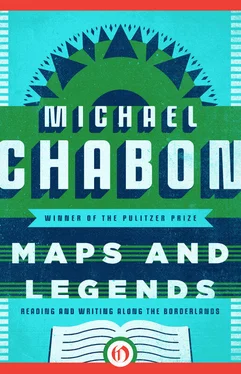There is also a strong current of conventional hard-edged naturalism at work in much post-apocalyptic science fiction that may further serve to draw and to reassure the mainstream writer. If the destruction is sufficiently great, life and its appurtenances are reduced to a finite set, mitigating the demand for baroque inventiveness imposed by other kinds of science fiction, while the extreme state of the natural world — global ice, global goo, global ocean — serves to reflect the extremes of human psychology, of grace under the ultimate pressure. The great British tradition of the post-disaster novel pioneered by M. P. Shiel’s The Purple Cloud and John Collier’s forgotten masterpiece Tom’s A-Cold, retooled in the fifties by John Wyndham and John Christopher and brought to a kind of bleak perfection by J. G. Ballard in the early sixties, is very much a mainstream naturalist tradition, cold-eyed and unadorned, and novels like Christopher’s No Blade of Grass and Wyndham’s The Day of the Triffids were popular successes that found a wide readership. For the post-apocalyptic is also a mode into which mainstream readers may venture without risking the stain of geekdom.
The status of relative legitimacy enjoyed by the literature of global disaster may in part result from the fig leaf that a satiric or religious purpose provides, and from the congeniality to conventional realism of a world without supercomputers, starships, or eight-foot feline warriors from the planet Kzin. But perhaps it is mostly a measure of the growing sense in the minds of readers and writers alike, since the mid-twentieth century, of the plausibility, even the imminence, of the end of the world. Instantaneous global pandemics, melting ice caps, and transgenic eco-calamity have joined large-scale nuclear exchange as stalwarts of the front page of the daily newspaper. Meanwhile the old retro apocalypse is selling better than ever these days, reformulated in science-fictional packaging as the Left Behind novels.
Cormac McCarthy would have suffered no risk to his literary reputation and presented no insurmountable difficulty to his large mainstream readership, therefore, if he had written a science-fiction novel called The Road about a father and son making their painful way across the carbonized waste of a post-holocaust America. And it is possible to imagine his having written such a book. Though he is not known as a satirist, his Blood Meridian, about a ruthless band of bounty hunters looking for Indian scalps in Texas in the 1850s, can be read at least in part as a bloody pasquinade on the heroic literature of westward expansion. A pawky gallows humor is a reliable if underappreciated element in much of McCarthy’s work, and in his only recent novel to be set more or less in the contemporary world, No Country for Old Men, about a man in southwest Texas, running for his life after stealing millions of dollars from a drug cartel, there are strong hints of the outrage, disgust, and sense of ineluctable decline that drive the satirist. And for naturalism operating at the utmost extremes of the natural world and of human endurance, a McCarthy novel has no peer.
Indeed many reviewers, if they have not chosen to bestow on The Road the dispensation of calling it a fable or a parable, seem to have read The Road as the turn toward science fiction that any established literary writer may reasonably be permitted. “I’m always thrilled,” wrote Alan Cheuse, emphasizing the novelty and, perhaps, the faint air of slumming that attends the notion of McCarthy’s move to the science-fiction neighborhood, “when a fine writer of first-class fiction takes up the genre of science fiction and matches its possibilities with his or her own powers.” “Part fable, part science fiction, total nightmare,” said the reviewer in USA Today, having it both ways at once.
2.
In brief outline the relatively simple plot of The Road would seem to support such a reading. The book is set in the burned-over ruin of what appears to be the southeastern United States, ten years after a man-made disaster that is never specified has destroyed not only civilization and society but also, seemingly, every form of life apart from an unknown but small number of starving, brutalized, and miserable humans, and at least — perhaps at most — one dog. The universal wildfires resulting from the initial “long sheer of light and then a series of low concussions” have burned so intensely for so long that the resultant cloud of ash blots out sun and stars. The forests are forests of ash; the days are cold and cheerless and the nights frigid. The unnamed protagonist, whose thoughts are so often presented without third-person attribution that at times he verges asymptotically near to being the novel’s narrator, spends his days trying to provide food, clothing, and warmth for his nameless son, who was born shortly after the disaster about ten years ago and has never known any world but this burned one.
Father and son travel south and east, toward the sea and what they hope will be a warmer climate. The father suffers from the respiratory ill-effects of a decade spent breathing ash and smoke, and is racked by spasms of bloody coughing that we understand from the first will eventually kill him. The son copes with the imperfectly understood and erratically imparted legacy of the past that he bears on his thin shoulders, attempting to reconcile the stories his father tells him with what is around him, to square the entire vanished culture and civilization implied by every word of American English that he speaks with the “cauterized terrain” of the unhistoried world he has inherited. It’s a dead planet, and human corpses, grotesque and pitiful and vividly depicted, people it.
The travelers make their way, rolling an old shopping cart piled with their pitiful hoard of canned food and blankets down a melted interstate, cold, starving, endangered by every other human being whose path they cross. Before they reach the sea — which turns out to be no warmer or more congenial than anyplace else they have been — they regularly encounter scattered hanks of the living who remain on the depilated surface of the earth. With few exceptions these encounters are replete both with bleak violence and acute suspense for the reader. The eventual safety of a character in a McCarthy novel is always in doubt, but the reader’s usual sense that a disembowelment or a clean shot to the brainpan lies only a paragraph away has never been so excruciating as in The Road, where the life of a child whose innocence is literally singular is threatened from the first paragraph of the novel.
As they travel the father feeds his son a story, the nearest that he can come to a creed or a reason to keep on going: he and his son are “carrying the fire.” Of what this fire might consist he can never specify, but from this hopeful fiction or hopeless truth the boy seems to intuit a promise: that life will not always be thus; that it will improve, that beauty and purpose, sunlight and green plenty will return; in short, that everything is going to be “okay,” a word which both characters endlessly repeat to each other, touching it compulsively like a sore place or a missing tooth. They are carrying the fire through a world destroyed by fire, and therefore — a leap of logic or faith that by the time the novel opens has become almost insurmountable for both of them — the boy must struggle on, so that he can be present at, or somehow contribute to, the eventual rebirth of the world.
For the father their life of constant motion, his intermittent good luck at finding provisions, and above all his long habit of seeing his boy as the only thing in the world worth saving and the saving of him as his only reason to live, have engendered a religious sense of mission with regard to his son that is inevitably defined as a greater salvation: it verges explicitly on the messianic. Apart from keeping his son’s body and soul together, this redemption is the father’s greatest preoccupation. But in the face of the bleakness and brutality of their lives his mission is difficult to sustain, and the father dies before he can see his son or the world redeemed.
Читать дальше
Конец ознакомительного отрывка
Купить книгу












